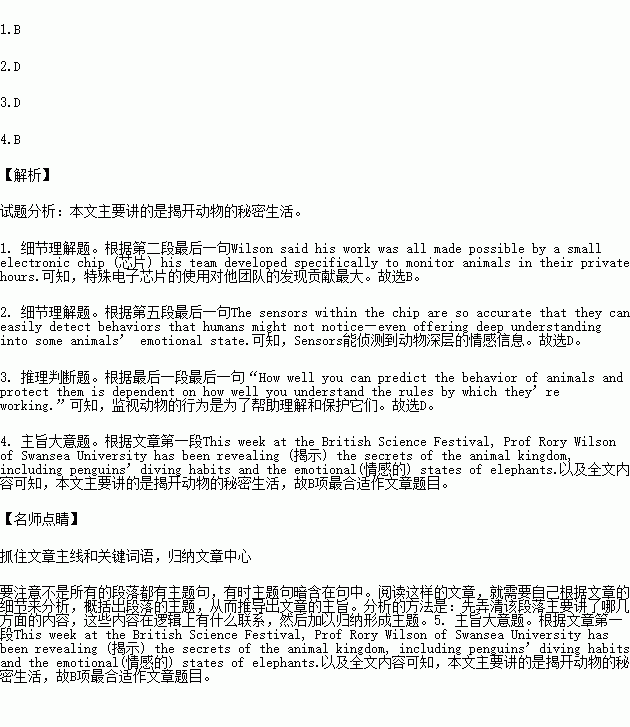题目内容

This week at the British Science Festival, Prof Rory Wilson of Swansea University has been revealing (揭示) the secrets of the animal kingdom, including penguins’diving habits and the emotional(情感的) states of elephants.
“The problem with animals is that we often want to know things about them that they don’t want to tell us or that aren’t easy to find out. The only way to do it is to put something on the animal that will accompany it,” Prof Wilson said. Addressing a crowd of journalists, Prof Wilson said his work was all made possible by a small electronic chip (芯片) his team developed specifically to monitor animals in their private hours.
This chip contains pressure, temperature and light sensors—offering an extraordinary view of an animal’s life. The chip, Prof Wilson explained, does exactly what our smartphones or fitness monitors do, continually tracking and recording the wearer’s position and movements. “This is a novel written by an animal. It’s very exciting to be the first person to open that novel.” This earlier chip was about five times larger than the current version, 27mm across and 4mm thick—and weighing 1.2g.
So far the group at Swansea has recorded the lives of more than 1,000 animals and 100 different species. Prof Wilson said the whole enterprise was a team effort. His group consists of academics, postdocs and students, who spend months searching through all the data collected by the chips.
Presenting results from a chip on a penguin in Argentina, he said the penguin was a personal favorite; he still analyzes these birds’ data himself. Looking at the huge screen in Prof Wilson’s lab, we could see the penguin’s individual steps. A change in movement and a drop in temperature indicate the exact moment of a dive into the water. The sensors within the chip are so accurate that they can easily detect behaviors that humans might not notice—even offering deep understanding into some animals’ emotional state.
Think of the way we humans walk. If someone is happy, this can be reflected in our physical behavior—it is often said that they “have a spring in their step”. To observe if this sort of phenomenon also occurs in animals, Prof Wilson’s team analyzed the walking movement of elephants in a zoo. They realized that an elephant walking towards something it liked would walk in a particular way. When that same elephant though was made to go away from the thing it liked, it would walk in a different manner. “How well you can predict the behavior of animals and protect them is dependent on how well you understand the rules by which they’re working.” Prof Wilson said.
1.According to Prof Wilson, what contributes most to his team’s discovery?
A. The cooperation of experts from different fields.
B. The use of a special electronic chip.
C. The personal interest in penguins.
D. The special way of data analysis.
2.It can be learned from the passage that the sensors can ________.
A. evaluate stress resulting from animals’ fighting
B. examine penguins’ unusual behavior while diving
C. distinguish different walking manners of elephants
D. provide information about the animals’ inner feelings
3.Monitoring animals’ behavior helps ________.
A. set rules for them
B. control their behavior
C. change their habits
D. understand and protect them
4.Which is the best title of the passage?
A. Inspiring ‘Novels’ Written by a Group from Swansea University
B. Pioneering ‘Diaries’ Uncover the Secret Lives of Animals
C. Penguins and Elephants Tracked for Emotional State
D. Scientists Made a Breakthrough in Animal Study
 课程达标测试卷闯关100分系列答案
课程达标测试卷闯关100分系列答案 新卷王期末冲刺100分系列答案
新卷王期末冲刺100分系列答案 全能闯关100分系列答案
全能闯关100分系列答案
